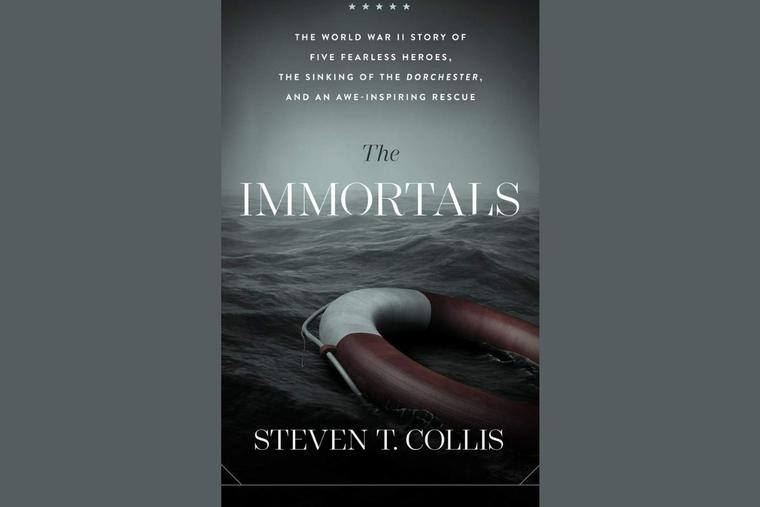4 War Chaplains’ Heroic Sacrifice
BOOK PICK: ‘The Immortals’

THE IMMORTALS
The World War II Story of Five Fearless Heros, the Sinking of The Dorchester, and an Awe-Inspiring Rescue
By Steven T. Collis
Shadow Mountain Publishing, 2021
280 pages, $18.99
To order: amazon.com
Selfless generosity is to be the hallmark of Christ’s disciples: “If anyone would sue you for your coat, give him your cloak as well” (Matthew 5:40, adapted from Douay-Rheims).
It didn’t take a lawsuit for Father John Washington to give away his life jacket. Rabbi Alexander Goode may not have followed Christ, but he handed over his gloves.
A German torpedo sent the SS Dorchester, with more than 900 U.S. soldiers on board, into the Atlantic off Greenland on the night of Feb. 3, 1943. Those who survived the blast tried to get into lifeboats or don life jackets to survive in the frigid waters. By the time the ship went down, all four chaplains had given away their life jackets.
The “four immortals” (adding ministers Clark Poling and George Fox) spent hours before the attack building morale by spiritual and human ministration, then keeping their heads to get as many men off the Dorchester alive in the roughly 30 minutes it took for the boat to sink. Freely giving away their lifesaving gear to save its recipients, the four bonded together decades before ecumenical and interreligious cooperation were common. They helped sustain men about to die and saved men who might otherwise have died.
Steven Corliss tells their story — and Charles David Jr.’s — in a gripping and fast-moving account. The four chaplains were already honored on a U.S. postage stamp in 1948. Charles David, far less known, was just as much a lifesaver. A Caribbean man of color, he was a petty officer responsible for kitchen duty in a segregated armed forces. But he was also a fantastic swimmer. He proved it by repeatedly diving into the ocean to get survivors aboard his cutter — so much so that he finally succumbed to pneumonia in a Greenland hospital.
The book is divided into three parts. In Part I, “Preparing for Battle,” Corliss plays a modern-day Brother Juniper, explaining how Providence brought those five men from different backgrounds together in the subarctic. Unlike Thornton Wilder’s Franciscan, Corliss’ protagonists were real men. Corliss reminds us how religious and racial barriers — some enforced, some self-imposed — were very real in 1943 America.
Part II, “War,” follows the ship’s 10-day journey, from Staten Island to Newfoundland to the Greenland coast, recounting how the four chaplains already began ministering to men, not just spiritually, but in the very physical way of helping landlubbers retching from seasickness and stacked in very close quarters.
Part III, “Decisions,” looks at what people chose to do in the 25 or so minutes it took the boat to go under — including to give away life vests and gloves, rush into dark, ammonia-filled decks looking for survivors (when the torpedo hit the deck, it ruptured internal piping, which released lots of ammonia that, in sufficiently intense doses, could be toxic), and then to gather together to die together.
Clark Poling was not a priest, but he was “a father, battle tested from training, and had no qualms about putting the boy [who wouldn’t take his life jacket] in his place. He flashed his rank on his uniform: ‘Get into it, soldier, and get into it fast.’ The boy obeyed. He slipped on the jacket. Clark likely clipped it for him. He didn’t wait for any more debate. With an open hand, he shoved the boy down the deck. The boy slid across the icy surface until he hit the rails, Clark on his heels. When they both stopped, Clark lifted him and threw him into the ocean.”
A great book to read on a cold winter’s night, one can imagine oneself plunged into the Atlantic in February. The man who got Rabbi Goode’s gloves floated eight hours, but survived.
James 2:16 warns about an empty faith that admonishes to “go in peace; keep warm and well-fed” without good works. With their own life vests for freezing soldiers and crackers for the seasick, John, Clark, George and Alex showed what it meant to follow the living God.

















